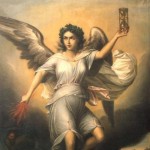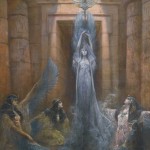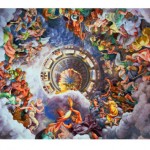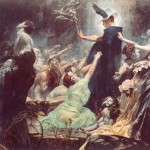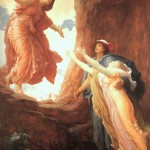‘Pagan’ has a vague and confusing definition that keeps us from understanding who we are and our importance at this time in history. Taking a historical view we can, however, eliminate a number of false definitions and come to focus on our unique nature. This contradicts many of the colloquial and even academic ideas about what and who is Pagan, but this deconstruction is a necessary process for us to attain to our rightful place in the world. So I ask: Who is Pagan?
I invite you to take a moment and set aside your preconceptions. Deconstruction of normative ideas can be unsettling. Since this is just a blog post, I don’t have the space to gently explain each point in detail. So to understand the implications of this analysis, take a moment to try on each idea—however odd it may seem—and looking out through its eyes, see what the world looks like if you treat each proposition below ‘as if’ it were true…
The main problem with how we try to define who is Pagan is that we tend to use Christian thinking and ask ‘what do we believe’? This is simply not relevant to most religions; beliefs are expected to change with time and maturity, and ours is no exception. What we do and where we came from are far more relevant than a list of items to be ‘believed’ or otherwise adhered to.
The term ‘pagan’ is itself problematic, rooted in a Roman military insult for non-military people, and adopted by Christians for all not enrolled in the Army of Christ. (The best summary of the discussion of the origin and development of the term ‘pagan’ today is from Owen Davies.) With that term, a huge swath of humanity gets called ‘pagan’, but we all know that most of them are not us, even if we have common cause with those who still exist today. So, let me deconstruct the term, first removing who we are not and then turning to what we are.
We are not the Ancients
One of the most common uses of the term ‘pagan’ is to name the ancient pre-Christian peoples. Doing so with the lower-case ‘p’ is standard among academics to differentiate the ancient folk from us, whom they quite properly call ‘Pagan’. Most people don’t even grant us this capital distinction. However, I see the use of ‘pagan’ for the Ancients as bad thinking that needs to stopped. Are we really trying to say that the Celts, the Norse, the Romans and the Egyptians are all somehow the same? Lumping them all together is a way of diminishing their distinctiveness. A consequence of this is that for me, there are no Neo-Pagans, since if the Ancients were not Pagan, there is nothing for us to be neo- to.
The problem of Time
We stand on the far side of a fundamental break in history. However much we reclaim the past, we will never be who they were. The breaks caused by overthrowing the geocentric cosmology, harnessing machinery and electricity, discovering germ theory, disease control, and reliable birth control, then globalization, atomic energy, mass communication and mass production, and so much more divide us irrevocably from the Ancient world. As someone alive only because of modern medicine, I have no motivation to go back to that world no matter how much I admire and learn from it. More importantly, as a student of history, it is very clear to me that we do not think as the Ancients did, and nothing short of a dark age would make us forget what we have learned.
We are not the ‘Foreigns’
‘Pagan’ originally simply meant not-Christian. The in-group was later expanded to include the other Abrahamic traditions, Judaism and Islam, but as Christianity met yet other cultures, they too were labeled ‘pagan’. The problem here is like that with the Ancients: the Yoruban, the Shinto, the Sami, the Hindu, the Maori have all been called ‘pagan’. How can this make any sense, except with the myopia that divides the world into Christian and non-Christian?
We need to really understand these cultures, especially the Hindu and Buddhist, because of the formative impact they had and have on the California stream of Paganism, which was so important to the development of the Pagan community as a whole. Likewise, we would do well to learn from Hindu organizational structure and ways of relating to scripture and authority. Similarly, I have found much in Buddhist modes of tantric ritual that can inform our own practice. But while we learn, it becomes ever more clear in that learning, that they are not us.
We are not the Indigenous
We are not the people referred to in contemporary parlance as ‘Indigenous’. While some are arguing for Paganism and Witchcraft to be survivals, even if true, none of us are actually living that life. Most of us don’t live where the cultures we base our religions on originated, which makes calling us indigenous difficult. While I fully agree we could have common cause with Indigenous folk for a rich array of reasons, calling ourselves that is disrespectful to the struggle for cultural, and at times, biological survival they are undergoing.
No, we are not the Ancients, the ‘Foreigns’, nor the Indigenous. For these reasons and many more, we are not really a part of their historical or cultural streams. When they are called ‘pagan’, it makes it hard to us to figure out who we are. We become lost in their shadow, nothing special, forgotten, marginalized, trivialized and sold in the marketplace as a lifestyle, fashion, and spiritualized entertainment.
Come together now
But the truth is that what we are draws from them all, Ancient, ‘Foreign’ and Indigenous. With allowance for those who are strictly reconstructing a specific Ancient religious life, the array of us who call ourselves Pagan invoke ancient Gods from a variety of cultures, speak of karma, drum ourselves into trance… These and so much more we take from the Ancients, the ‘Foreigns’ and the Indigenous so that, although we are not them, we are the younger sibling of them all.
We arose with the Renaissance
When we carefully trace our history, we have have to deal with two facts. First, Christianity won. The ancient ways were effectively destroyed. Tech, as it does, persisted: in the form of the Catholic Mass, sacraments, and associated rites on the one hand, and as spell work, what we anglophones call cunning-craft. But the ancient religious basis for these was lost and they were transformed into Christian practice, however unorthodox.
Second, tech persists. When the Renaissance reclamation of ancient knowledge ignited in Florence, along with it came a significant body of ancient religious tech which was re-appropriated, Christianized, and became the magical or Occult movement. Over time it became safer and more desirous on the part of some to progressively de-Christianize magical practice until in the twentieth century there were people who self-identified as Pagan and explicitly not-Christian. We are their direct descendants.
We are deeply entwined with science
Another aspect of who we come from, is that the magical movement of the Renaissance is deeply entwined with the rise of science and technology. The early, or perhaps better proto- scientists were often, although not always, doing things we would associate with magic, like astrology or alchemy. Engineers of clever devices like automatons were called mechanical-magicians. While there is significant debate on the degree of impact magic had on the formation of science, the influence is generally acknowledged. This makes us very different from most other religions.
Although I don’t hear this much today, back in the 1980s, we used to say loudly that our Pagan religion had no conflict with science, but took inspiration from it. As we see the discrediting of science by Christians, we must remember that they are destroying the basis for civil peace. The wars of religion in Europe, which motivated the writers of the US Constitution to formally separate church and state, ended with the recognition that science provided a theologically neutral basis for policy discussion. Whatever your faith, reason and fact were able to be taken as ‘the givens’ in decision making. The loss of this foundation has paralyzed our current Congress, which instead takes ideology as its basis, even in the face of evidence. The consequences are enormous.
Our religion has a positive relationship with science, and by not basing our religion on the shifting sands of mere belief, as we learn, we grow and change our understandings of what we do. Sometimes we learn from science; sometimes we see Spirit though science and add to our religion because of science. (O Nuit. . . )
Who is Pagan?
To understand our importance to the world, we need to realize that we are something new. We are building a new religious way of life that is embodied, life affirming, and in harmony with the natural, non-human, World. Building a new religion is far more creative and revolutionary than merely resuscitating a survival of ancient days. That a religion can be at all created in modern times is a profound threat to the established authoritarian faiths around us. (Not so much to the ‘Foreigns’ and the Indigenous, with whom we have significant common cause.) Every effort to assimilate us to their culture, that of the ‘faiths’, will be made, including ignoring the simple truth of what we are.
We Pagan folk practice a new religion, founded on the old, the foreign, and the indigenous. We combine all of the World’s spiritual inheritance into a open, inclusive mode of personal spirituality and communal worship that finds the Sacred in the non-human World as well as in ourselves. Our historical relationship with science, as with other cultures, places us in a unique position to help our species survive its greatest challenge ever: becoming adult. We who do this, we are Pagan.
Next time: How Pagans will save the world


